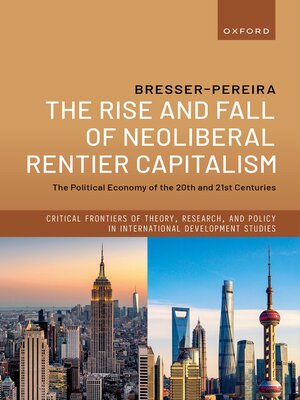The Rise and Fall of Neoliberal Rentier Capitalism
ebook ∣ The Political Economy of the 20th and 21st Centuries · Critical Frontiers of Theory, Research, and Policy in International Development Studies
By Luiz Carlos Bresser-Pereira

Sign up to save your library
With an OverDrive account, you can save your favorite libraries for at-a-glance information about availability. Find out more about OverDrive accounts.
Find this title in Libby, the library reading app by OverDrive.



Search for a digital library with this title
Title found at these libraries:
| Library Name | Distance |
|---|---|
| Loading... |
The Rise and Fall of Neoliberal Rentier Capitalism is an account of the political economy of capitalism in the 20th and 21st centuries. Capitalism is an unjust form of economic organisation; it is a culture of exacerbated individualism justified by the glorification of individual competition. Today, after 40 years of neoliberalism, capitalism faces again a legitimation crisis. The book discusses capitalism after two revolutions - the Organisational Revolution and the Democratic Revolution. It views capitalism since the New Deal in the US and the post-war as a progressive and developmental era and the Neoliberal Turn as the change from social democracy to radical and regressive global neoliberalism, which was a regressive time for almost forty years. In the Neoliberal Years, rentiers replaced entrepreneurs in the command of the economy and called on the financiers to manage their wealth and serve as organic intellectuals, and both mounted an attack to the state, which is the main capitalist institution. The global crisis and, in 2020, the Covid pandemic showed that the state remains the nations' resource of last instance. The transition of China from statism to an active developmentalism resulted in an extraordinary growth. Given such realities, in 2021 we saw the collapse of neoliberalism, and in the United States, a Developmental Turn - the state is back in the economy. The transition phase we live in is characterised by three main forces - economic liberalism, managerialism, and democracy. Economic liberalism is the great defeated, managerialism became powerful and is developmental, and democracy is the stronger force. It was attacked by neoliberalism and is now being attacked by right-wing populism, but resisted and resists brilliantly, proving that it was a conquest of the popular classes that became a universal value counting on the support of all social classes.







